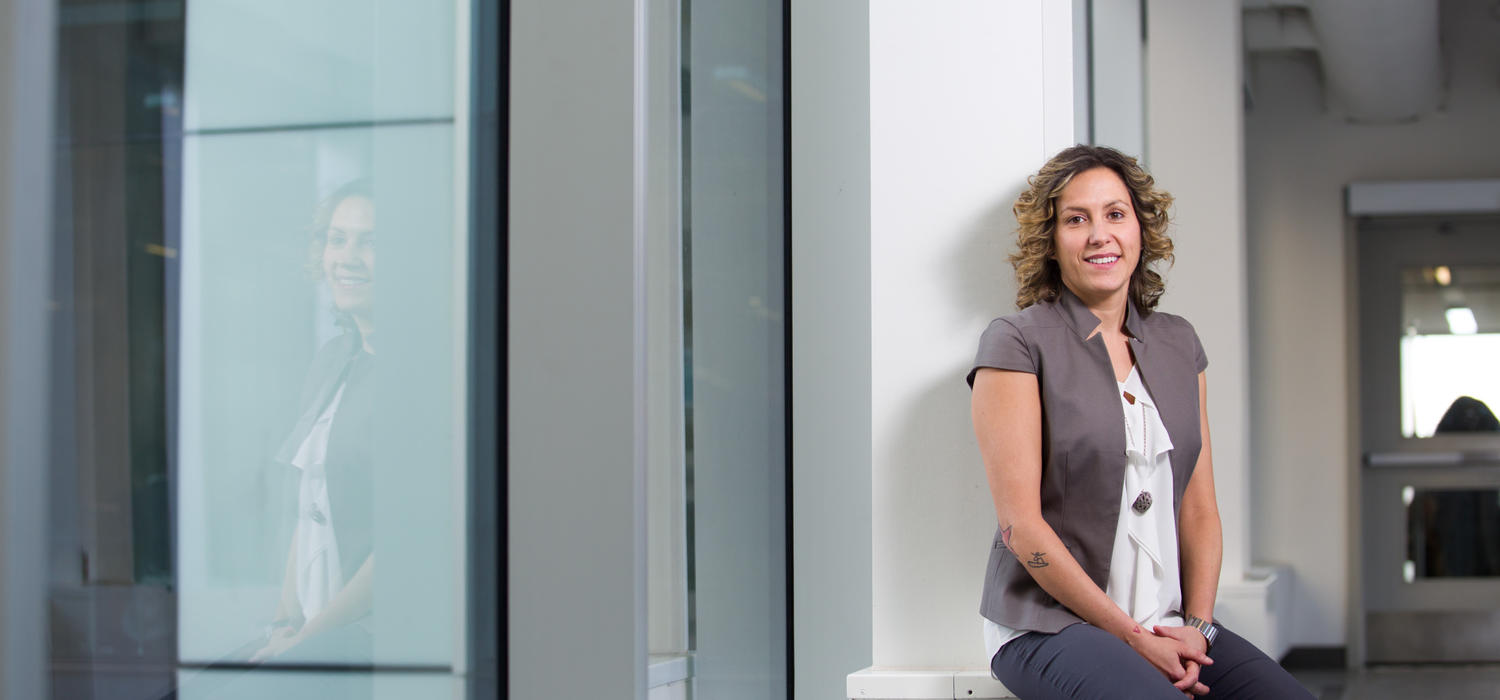Dec. 5, 2017
Hero in our midst: Carla Bertsch champions mental health for sexual violence victims/survivors

When talking about heroes, we often think of Superman or Wonder Woman using superpowers to fight evil. In real life, heroes aren’t like that at all. Our heroes walk among us, provide aid, stand up for those who need it most and rarely ask for much in return. For the more than 39 per cent of women and 12 per cent of men who have experienced at least one incident of sexual violence in Canada, Carla Bertsch is that type of hero.
Recently joining the UCalgary community in September 2017, Bertsch fills a unique role as the university’s first sexual violence support advocate where she helps students, faculty and staff who have experienced sexual violence seek accommodations on campus.
“It’s pretty hard when you’re living through a traumatic event and your grades are falling, or you haven’t been to work in a while and you’re losing income, to initiate conversations where you have to advocate for yourself,” explains Bertsch. “It eases the strain on your mental health to have someone that you can unload on, who can have those conversations for you and be your champion.”
Social responses to disclosure have significant impacts on mental health
There is an alarming list of mental health challenges correlated with sexual violence, including depression, anxiety, anger, personality disruptions, addiction, suicide, eating disorders and sleeping disorders. According to the United States’ National Centre for PTSD, sexual assault is the most frequent cause of post-traumatic stress disorder (PTSD) in women — rates among survivors/victims are drastically higher than the national prevalence.
Bertsch highlights that early intervention is crucial for combating mental health concerns. “The longer we allow the trauma to consume us, the greater risk we have for mental health concerns like depression, anxiety, PTSD — those things will be exacerbated the longer we retreat from our everyday routine,” she explains.
Seeking resources, including emotional or medical support on- or off-campus, is also an important step in combating academic concerns. “For students, the immediate impact is on academics. If you miss class because you can’t get out of bed, your academic success may be jeopardized,” says Bertsch.
The trauma of the event isn’t the only factor affecting mental health. The social response individuals receive from disclosing sexual violence can either be damaging or helpful in the healing process. Bertsch identifies not believing and victim-blaming to be prominent issues.
“An ill-judged response can be more traumatic than the original act of violence, because it feels like a betrayal,” says Bertsch. “It takes a lot of courage to talk about sexual violence, so when you don’t get the support you expect, it causes a lot of harm.”
On the flip side, receiving a supportive response is the primary element in combating mental health concerns. Care and concern, listening without judgment, believing the victim/survivor, and expressing a desire to help are positive responses that aid the healing process.
Seeking support in UCalgary communities
Bertsch’s position enhances mental health resources and is a positive step toward creating a supportive campus environment. “Carla’s role is vital to our campus. Although we have many mental health resources, her position fills a gap by offering necessary support for victims/survivors of sexual violence,” says Andrew Szeto, director of the Campus Mental Health Strategy.
Since starting her role, Bertsch has experienced positive reactions from the UCalgary community and encourages individuals to reach out for support. “Everyone I have dealt with recognizes the sooner individuals can access the resources they need, the lower the effects are on mental health,” says Bertsch. “Initiatives like the Campus Mental Health Strategy and the Indigenous Strategy show that the university is working hard to create a safe, inclusive culture on campus where people can feel safe to disclose acts of violence. I’m just proud to be part of it.”
If you think you have experienced sexual violence, or know someone who has, visit the Sexual Violence Support website for campus and community resources. You can also arrange a confidential consultation with Carla Bertsch by confidential email.
The United Nations International Day for the Elimination of Violence Against Women on Nov. 25 is committed to creating a world free of violence for all women and girls around the world. The University of Calgary is hosting a memorial on Dec. 6 commemorating the National Day of Remembrance and Action on Violence Against Women. For more information on the memorial event, visit the Women’s Resource Centre.
